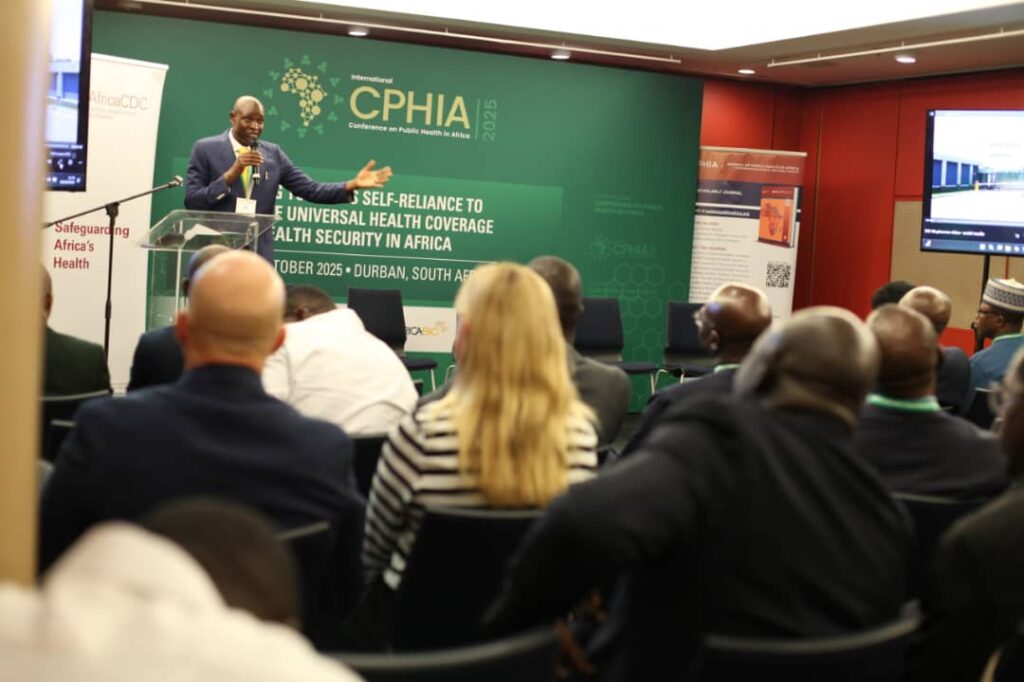
SOUTH AFRICA. Ugandan celebrated scientist and founder of Dei BioPharma, Dr. Matthias Magoola has revealed that his company has secured new patent rights for Ebola and Mpox vaccines.
Speaking Friday at the 4th International Conference on Public Health in Africa, Magoola said he welcomed Africa Center for Diocese Control’s interest in Dei BioPharma’s innovation.
He added that the firm looks forward to the CDC technical team’s inspection of the Drugs and Vaccines Manufacturing Facility being developed at its Matugga campus in Wakiso District. He said the biotech firm is ready to be designated as Africa’s Contract Drug Manufacturing Organization, or CDMO.
Magoola, who spoke during a session on “Setting the scene: Technical Stocktaking, Knowledge,” said the firm is ready to become the “Continental CDMO for APIs, Biologics, Vaccines, Oncology, mRNA, Cell and Gene therapy.”
“We urge all African nations and authorities to rally behind us and we are ready to sign a Memorandum of Understanding with Africa CDC to be designated as a continental CDMO,” he said.
The conference also featured Dr. Monica Musenero, Uganda’s minister of science, technology and innovation, who called for increased investment in research and development. She described R&D as the “missing link” in Africa’s economic and health transformation.
Dr. Musenero challenged the scientists to offer practical solutions of Africa’s scientific knowledge into profitable industries.
“If every input—from vials to machines—is imported, are we truly manufacturing? Without R&D, such efforts may even hurt the economy,” she said.
She praised the current US government’s move to funding into the health programmes in Africa, arguing that the drastic measure had created positives where African health professionals have been forced to find home made solutions.
Raji Tajudeen, the Deputy Director-General of Africa CDC, stressed that health sovereignty would only come through sustained investment in R&D and manufacturing.
“It took millions of deaths during COVID-19 for us to realise we lacked the capacity for research and vaccine production. A continent of 1.5 billion people should not be manufacturing only one per cent of its vaccines,” he said.
Dr. Magoola indicated that the Dei BioPharma is able to shorten the Africa CDC agenda of having 60 percent of the vaccines used in Africa manufactured from home by 2040 – from the 15 projected years to 7 years.
On the two new patents for the crucial Ebola and Mpox vaccine inventions – Dr. Magoola said the pioneering mRNA Ebola vaccine— is a transformative milestone that affirms Africa’s capacity to invent, protect, and advance world-class biomedical technologies.
“The patent represents a breakthrough in the continent’s pursuit of scientific and economic independence, demonstrating that high-impact innovation can originate and be owned entirely within Africa”.
He said the new patented vaccine utilizes messenger RNA technology to encode the Ebola virus glycoprotein in a lipid-nanoparticle formulation, offering an unprecedented combination of speed, safety, and scalability.
He said that unlike conventional viral-vector vaccines, the Dei BioPharma mRNA platform can be rapidly manufactured without the use of live virus, enabling a faster response to future outbreaks and reducing dependence on external suppliers.
The achievement positions Dei BioPharma as a trailblazer in next-generation vaccine design and manufacturing on the continent.
Dr. Magoola described the patent as “a defining moment in Africa’s scientific story,” noting that for decades, Africa has relied on imported health technologies developed elsewhere.
“Today,” he said, “we move from dependency to self-determination. Africa is no longer waiting for solutions—it is creating them.”
On the Mpox vaccine, Dr. Magoola said the invention utilizes messenger RNA technology to encode the MPOX virus glycoprotein in a lipid-nanoparticle formulation, offering an unprecedented combination of speed, safety, and scalability.
He added that unlike conventional viral-vector vaccines, the Dei BioPharma mRNA platform can be rapidly manufactured without the use of live virus, enabling a faster response to future outbreaks and reducing dependence on external assistance.
The two milestone build upon Dr. Magoola’s remarkable record of leadership and innovation. In 2025, Dei BioPharma announced its entry into active pharmaceutical ingredient manufacturing in Uganda, launching a historic program to produce high-cost patented drugs locally and make them affordable across low- and middle-income nations.
The same year, Dr. Magoola received multiple international honors recognizing his contributions to biotechnology and healthcare innovation, including the African Excellence & Personality Award 2025 in Ghana, a Lifetime Achievement Award in Canada, and Uganda’s Faces of Science Award for advancing pharmaceutical manufacturing and research.
He also published groundbreaking research on RNA-based cancer therapies that underscored Dei BioPharma’s growing influence in RNA and biologics science.
Under his guidance, Dei BioPharma and its parent organization, Dei Group International, have collectively filed over one hundred patents spanning oncology, infectious diseases, and advanced therapeutic modalities—cementing the company’s status as one of Africa’s most prolific scientific institutions.
The new Ebola and MPOX vaccines patent stands as proof of Dei BioPharma’s long-term vision of technological sovereignty.
It enables the company to advance Africa-born innovations from the laboratory to market, establish its own regulatory and clinical pathways in partnership with the Africa CDC and WHO, and expand its portfolio of mRNA platforms adaptable to Marburg, Lassa fever, and other endemic diseases.
It also reinforces Dei BioPharma’s economic strategy of reinvesting intellectual property value into domestic research, regional capacity building, and job creation in biotechnology.
“This patent is more than scientific recognition—it is continental empowerment,” Dr. Magoola remarked. “We are entering a new chapter in which African scientists protect African lives with African inventions.”
Dei BioPharma, a subsidiary of Dei Group International, continues to build Africa’s first fully integrated biopharmaceutical complex in Matugga, Uganda, dedicated to producing vaccines, biosimilars, and RNA-based therapeutics.
The facility will serve as a cornerstone for Africa’s self-sustaining biomanufacturing ecosystem, ensuring that future innovations—like the Ebola mRNA vaccine—are conceived, produced, and distributed within Africa for the benefit of its people and the world.